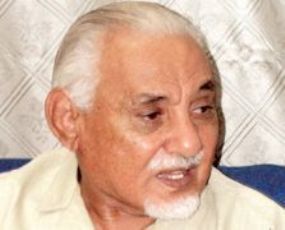DUP figure criticizes nomination of party chief to head pro-unity body
August 29, 2010 (KHARTOUM) – A senior figure within the opposition Democratic Unionist Party (DUP) has censured the nomination of the party’s leader, Mohamed Osman Al-Mirghani, to head the Unity Support Commission formed by the ruling National Congress Party (NCP), saying that the veteran opposition figure was not a member of the NCP to be appointed to the position.

The south, where most people are Christian or follow traditional beliefs, is widely expected to opt for secession from the Arab-Muslim dominated north.
Speaking to Sudan Tribune by phone from London, the DUP deputy chief Ali Mahmood Hassanein said that Al-Mirghani “was not a member of the NCP, so how come he gets nominated for such a position by a party to which he does not belong?”
He added that the NCP “should have nominated one of its members for the position.” According to Hassanein, “the aim of the NCP move is to slaughter Al-Mirghani as a political leader and the DUP later on by involving them in this crime: secession of Sudan.”
Hassanein has always stood out as a dissenting voice within the DUP and became the most vocal in opposition to the ruling party. He was detained in July 2008 on charges of attempting to overthrow the government.
Now at the age of 76, he fled Sudan to London in 2009 after receiving death threats because of his publicly declared support of the jurisdiction of the International Criminal Court (ICC) to investigate war crimes in Sudan’s westernmost region of Darfur.
The war in Darfur region broke out in 2003 after rebel groups belonging mostly to African ethnicities took up arms against the NCP-led government in Khartoum, accusing it of marginalizing the region in terms of development and wealth-sharing.
Khartoum responded by mobilizing its allied Arab militias known as the Janjaweed who carried out a brutal counterinsurgency campaign that killed 300.000 people and drove more than 2 million from their homes, according to UN figures.
Separately, the opposition figure disclosed that he had established an all-embracing opposition umbrella dubbed as the National Broad Front (NBF). Hassanein told Sudan Tribune that the objective of the NBF was to “topple the ruling party in Sudan and refrain from any dialogue with it”.
He further revealed that his movement had attracted individuals from all hues in the Sudanese political arena and that it is due to hold its general-congress in London in late October.
Hassanein dismissed reports carried by the security-run Sudan Media Centre (SMC) that representatives of Darfur armed groups were present in a preparatory meeting of the NBF in London.
He said that they did not extend invitations to mainstream political parties or armed groups in Darfur. He added that the front’s struggle to remove the regime is based on political work and that armed groups in Darfur were contributing to this peaceful political attempt.
According to Hassanein, Darfur groups are entitled to adopt armed struggle but this method does not fall within the purview of the NBF.
The sectarian DUP was the second largest partner in the last democratically elected government in 1986. However, after the 1989’s coup that brought president Al-Bashir to power, the party’s leader Al-Mirghani headed the National Democratic Alliance (NDA) which fought the Bashir government in the 1990’s.
In 2005, Al-Mirghani signed a reconciliation agreement with the Sudanese government in Cairo and took part in the federal government. The DUP was one among the dearth of parties that did not boycott April’s disputed elections but the party lost elections even in its historical strongholds and later described the polls as rigged.
Factionalism and mass defections have fractured the DUP in recent years. The party’s leader Al-Mirghani is seen as growing closer to the NCP.
(ST)

Timdor
DUP figure criticizes nomination of party chief to head pro-unity body
Bribery and Rigging commission,this is the latest institution of its kind which shall deal with Southerners who are pro-separation activities.
GOSS,can you financially support the civil society groups that are working tirelessly for the separation of the South? The war has move from negotions into money strategy!
Timdor